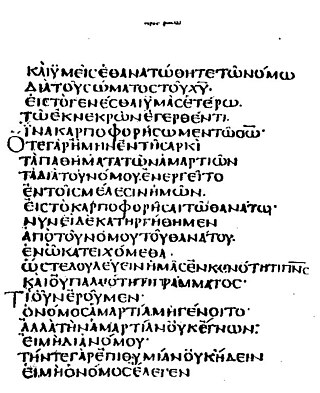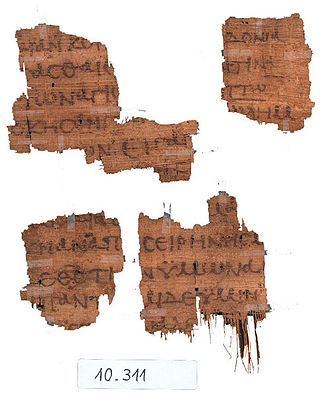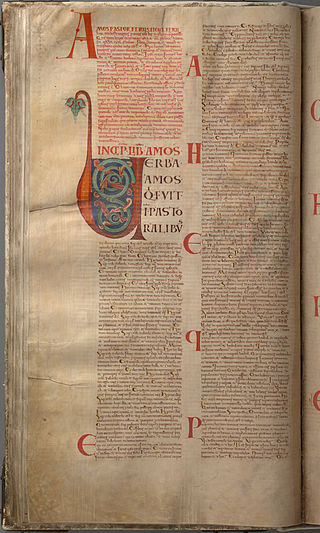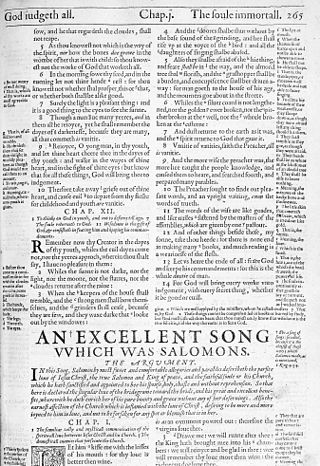
Mark 10 is the tenth chapter of the Gospel of Mark in the New Testament of the Christian Bible. It presents further teachings of Jesus as his journey progresses towards Jerusalem.
Romans 9 is the ninth chapter of the Epistle to the Romans in the New Testament of the Christian Bible. It is authored by Paul the Apostle, while he was in Corinth in the mid-50s AD, with the help of an amanuensis (secretary), Tertius, who adds his own greeting in Romans 16:22.

Romans 7 is the seventh chapter of the Epistle to the Romans in the New Testament of the Christian Bible. It is authored by Paul the Apostle, while he was in Corinth in the mid-50s AD, with the help of an amanuensis (secretary), Tertius, who adds his own greeting in Romans 16:22.

Acts 3 is the third chapter of the Acts of the Apostles in the New Testament of the Christian Bible. The book containing this chapter is anonymous but early Christian tradition affirmed that Luke composed this book as well as the Gospel of Luke. This chapter records the healing of a disabled person by the apostles Peter and John, and Peter's preaching at Solomon's Porch in the Second Temple.

Romans 1 is the first chapter of the Epistle to the Romans in the New Testament of the Christian Bible. It is authored by Paul the Apostle, while he was in Corinth in the mid-50s AD, with the help of an amanuensis (secretary), Tertius, who adds his own greeting in Romans 16:22. Acts 20:3 records that Paul stayed in Greece, probably Corinth, for three months. The letter is addressed "to all in Rome who are loved by God and called to be saints".

Romans 5 is the fifth chapter of the Epistle to the Romans in the New Testament of the Christian Bible. It is authored by Paul the Apostle, while he was in Corinth in the mid-50s AD, with the help of an amanuensis (secretary), Tertius, who adds his own greeting in Romans 16:22.

Romans 6 is the sixth chapter of the Epistle to the Romans in the New Testament of the Christian Bible. It is authored by Paul the Apostle, while he was in Corinth in the mid-50s AD, with the help of an amanuensis (secretary), Tertius, who adds his own greeting in Romans 16:22. In this chapter, it is shown that the Christian, in baptism, dies to sin.
Romans 8 is the eighth chapter of the Epistle to the Romans in the New Testament of the Christian Bible. It was authored by Paul the Apostle, while he was in Corinth in the mid-50s AD, with the help of an amanuensis (secretary), Tertius, who added his own greeting in Romans 16:22. Chapter 8 concerns "the Christian's spiritual life".
Romans 10 is the tenth chapter of the Epistle to the Romans in the New Testament of the Christian Bible. It is authored by Paul the Apostle, while he was in Corinth in the mid-50s AD, with the help of an amanuensis (secretary), Tertius, who adds his own greeting in Romans 16:22. Paul continues his discussion of Israel's rejection of God's purpose which he had commenced in chapter 9: despite his "anguish over Israel" it remains his "heart's desire and prayer to God for the Israelites that they may be saved".

Romans 11 is the eleventh chapter of the Epistle to the Romans in the New Testament of the Christian Bible. It is authored by Paul the Apostle, while he was in Corinth in the mid-50s AD, with the help of an amanuensis (secretary), Tertius, who adds his own greeting in Romans 16:22.
Romans 14 is the fourteenth chapter of the Epistle to the Romans in the New Testament of the Christian Bible. It is authored by Paul the Apostle, while he was in Corinth in the mid-50s AD, with the help of an amanuensis (secretary), Tertius, who adds his own greeting in Romans 16:22. Protestant Reformer Martin Luther summarised this chapter as Paul's teaching that "one should carefully guide those with weak conscience and spare them; one shouldn't use Christian freedom to harm, but rather to help, the weak". Lutheran theologian Johann Albrecht Bengel says that Paul "refers all things to faith".

Romans 15 is the fifteenth chapter of the Epistle to the Romans in the New Testament of the Christian Bible. It is authored by Paul the Apostle, while he was in Corinth in the mid-50s AD, with the help of an amanuensis (secretary), Tertius, who adds his own greeting in Romans 16:22.

2 Corinthians 7 is the seventh chapter of the Second Epistle to the Corinthians in the New Testament of the Christian Bible. It is authored by Paul the Apostle and Timothy in Macedonia in 55–56 CE.

Galatians 6 is the sixth chapter of the Epistle to the Galatians in the New Testament of the Christian Bible. It is authored by Paul the Apostle for the churches in Galatia, written between 49–58 CE. This chapter contains Paul's exhortations and also a summary of the key points in the epistle.

James 4 is the fourth chapter of the Epistle of James in the New Testament of the Christian Bible. The author identifies himself as "James, a servant of God and of the Lord Jesus Christ" and the epistle is traditionally attributed to James the brother of Jesus, written in Jerusalem between 48 and 61 CE. Alternatively, some scholars argue that it is a pseudographical work written after 61 CE. This chapter continues a directive on wisdom and humility from chapter 3, followed by a warning to the rich.
Isaiah 6 is the sixth chapter of the Book of Isaiah in the Hebrew Bible or the Old Testament of the Christian Bible. This book contains the prophecies attributed to the prophet Isaiah, and is one of the Books of the Prophets. It records the calling of Isaiah to be the messenger of God to the people of Israel.

Amos 2 is the second chapter of the Book of Amos in the Hebrew Bible or the Old Testament of the Christian Bible. This book contains the prophecies attributed to the prophet Amos, especially charges against Moab, Judah, and lastly Israel, the chief subject of Amos' prophecies. It is a part of the Book of the Twelve Minor Prophets.

Ezekiel 44 is the forty-fourth chapter of the Book of Ezekiel in the Hebrew Bible or the Old Testament of the Christian Bible. This book contains the prophecies attributed to the prophet/priest Ezekiel, and is one of the Books of the Prophets. The final section of Ezekiel, chapters 40-48, give the ideal picture of a new temple. The Jerusalem Bible refers to this section as "the Torah of Ezekiel". In particular, chapters 44–46 record various laws governing the rites and personnel of the sanctuary, as a supplement to Ezekiel's vision.

Jeremiah 11 is the eleventh chapter of the Book of Jeremiah in the Hebrew Bible or the Old Testament of the Christian Bible. This book contains prophecies attributed to the prophet Jeremiah, and is one of the Books of the Prophets. This chapter includes the first of the passages known as the "Confessions of Jeremiah".

Ecclesiastes 12 is the twelfth chapter of the Book of Ecclesiastes in the Hebrew Bible or the Old Testament of the Christian Bible. The book contains philosophical speeches by a character called 'Qoheleth', composed probably between the 5th and 2nd centuries BCE. Peshitta, Targum, and Talmud attribute the authorship of the book to King Solomon. This chapter continues the previous one in the sustained encouragement to make decision and the need to act speedily.














